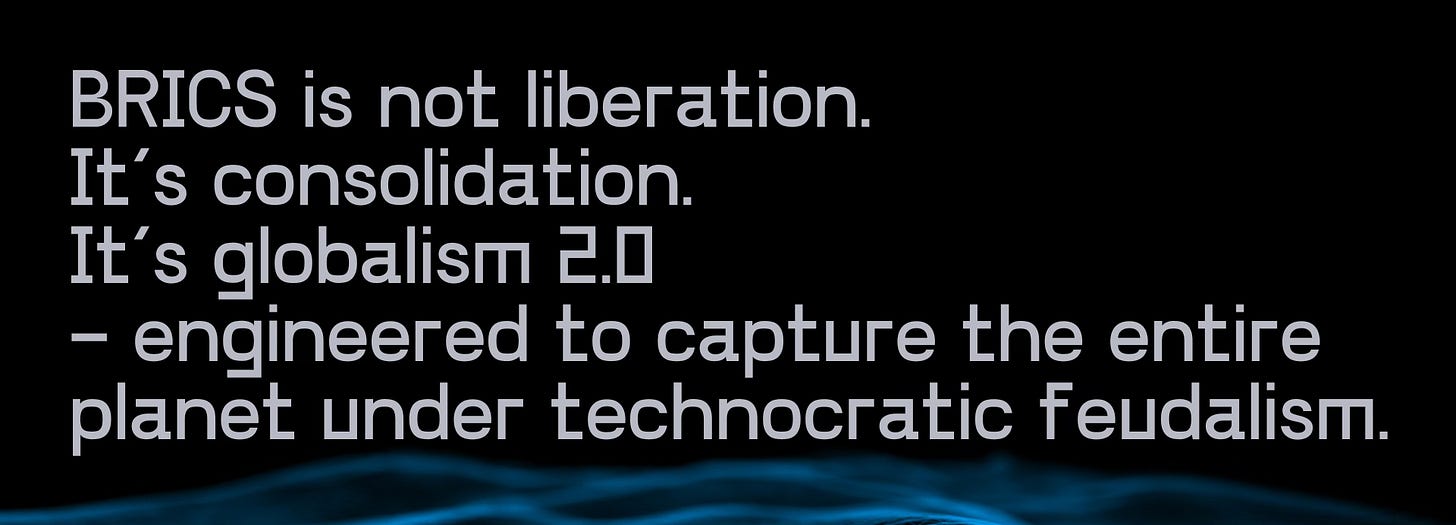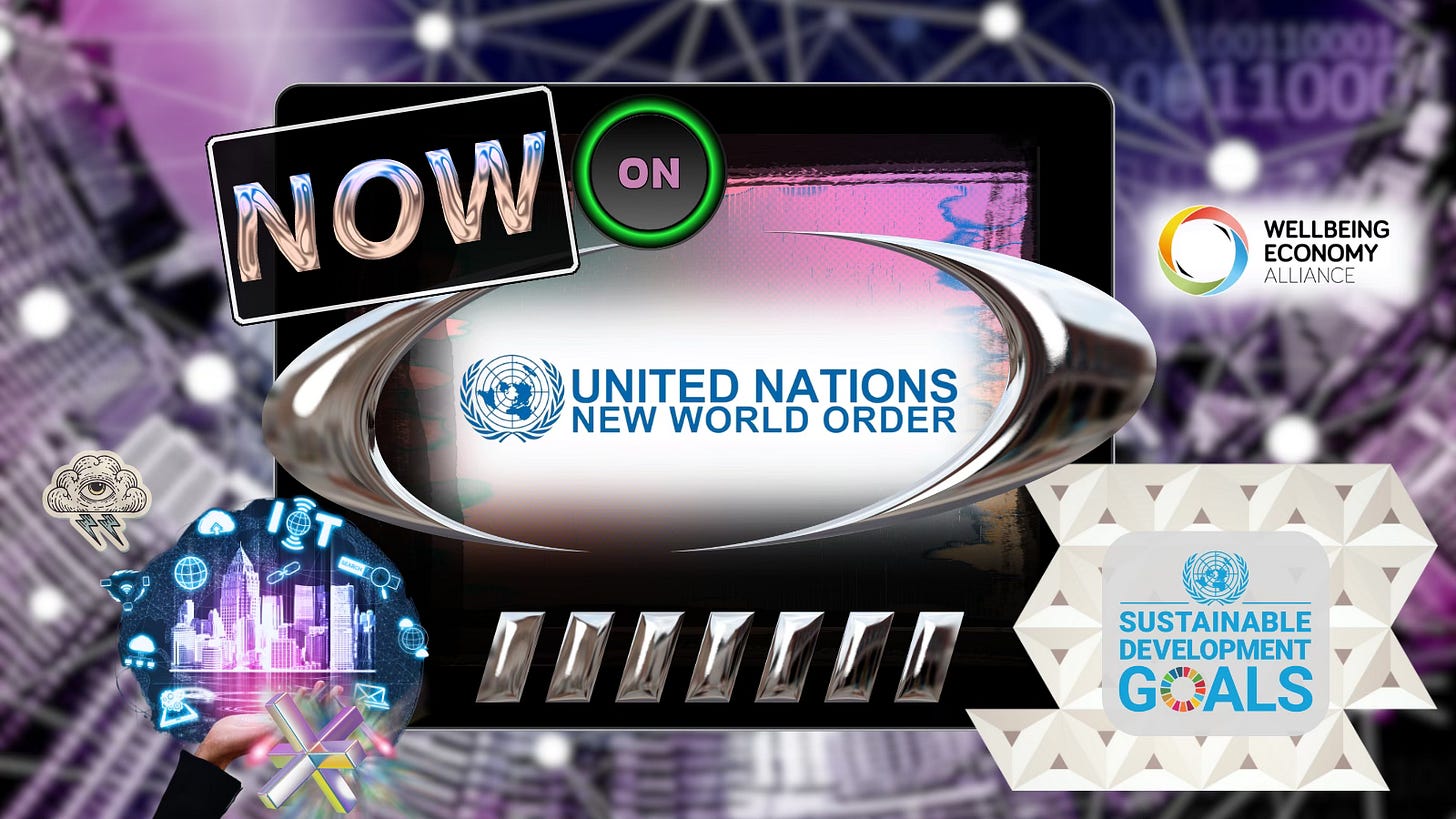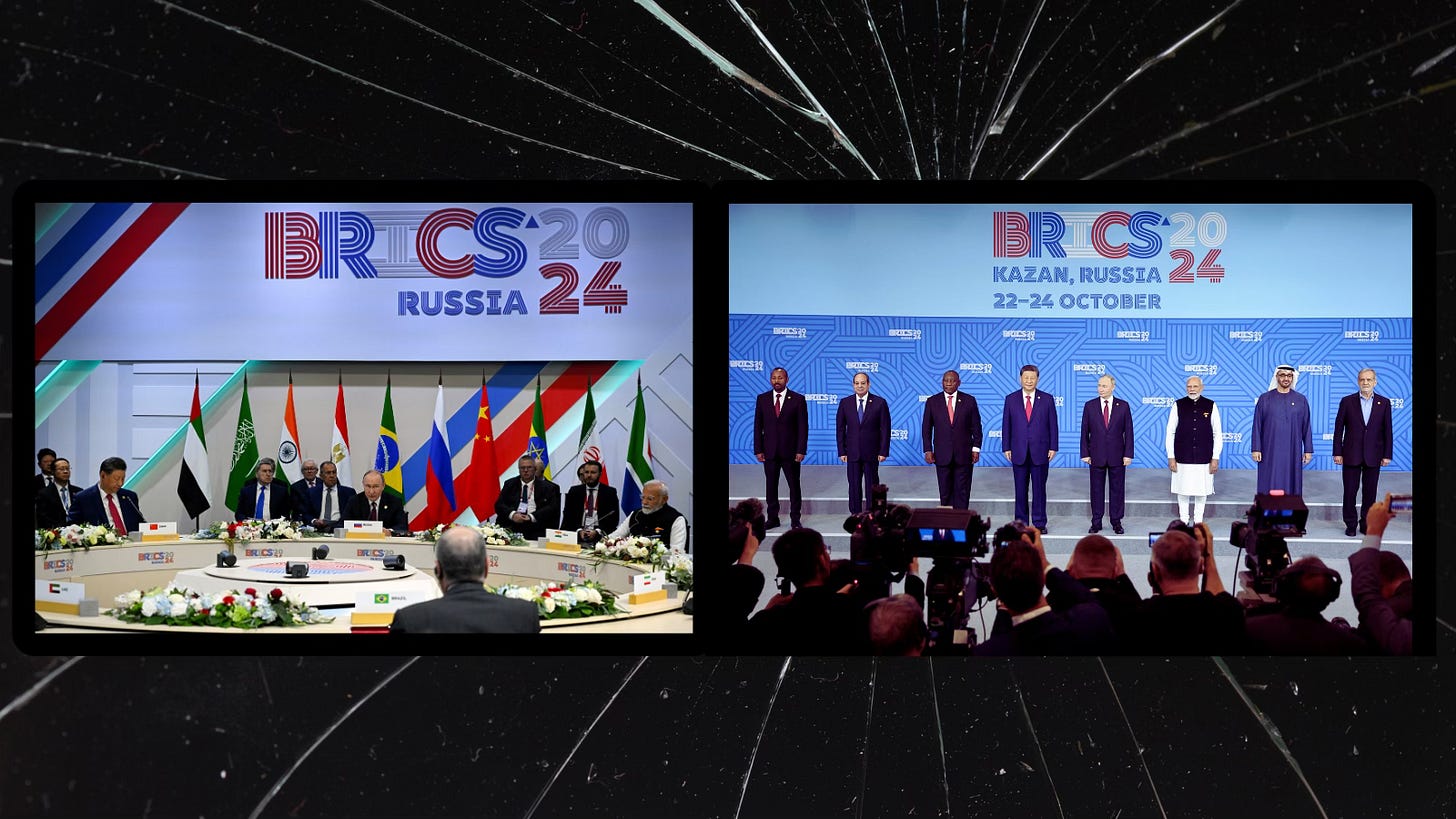BRICS+ Trojan Horse of Technocratic Control
BRICS propaganda analyzed re: the illusion of liberation.
The Western empire's decline is being celebrated by many anti-imperialists, but in reality, this is simply a restructuring of global power, not a revolution against it.
In a world increasingly disillusioned by the apparent failures of Western civilization, failures that are not organic, but deliberately engineered, a planned narrative has emerged, carefully reinforced to present a curated ‘alternative’ that serves the very same global power structure. This alternative comes dressed in the language of multipolarity, anti-imperialism, and economic sovereignty. And at the center of it all stands BRICS+.
Marketed as a global alliance of resistance against U.S. hegemony and Western dominance, BRICS+ appears, at first glance, to offer hope as being some kind of new alternative. But this hope is a mirage. Behind the friendly faces and summit photo ops lies a much deeper strategy: to usher the world into a new phase of global control, one that trades the boots and bombs of overt empire for biometric IDs, smart city surveillance, programmable digital currencies, and the artificial intelligence architecture of the Fourth Industrial Revolution.
Today, we break down a prime case of this narrative engineering: a BRICS+ propaganda article published by Think BRICS on Substack, which paints the bloc as the torchbearer of freedom and justice in the 21st century. But a closer look reveals the truth, this is not journalism. This is a psychological operation designed to seduce the disillusioned masses into embracing a false liberation movement, one that ultimately leads not to sovereignty, but to the greatest colonization humanity has ever known.
Let’s dismantle the illusion—piece by piece.
What we’re witnessing is not a revolution, but a rebrand. BRICS+ is not the enemy of globalism, it is globalism’s next phase, presented in a new accent. The very same financial, institutional, and technocratic forces that governed the old order are simply shifting their base of operations.
The BRICS Propaganda Article:
The Bait-and-Switch: "US Bad = BRICS Good"
The article opens with a lazy binary:
“BRICS opens doors and the US closes them.”
This framing sets up a false dichotomy, where Western hegemony (specifically the U.S.) is bad—and therefore, BRICS must be good. It appeals emotionally to those tired of American hypocrisy, war-mongering, and economic coercion, but it deliberately ignores that BRICS is not anti-globalist, it is the next phase of globalism.
The U.S. may be closing its doors in one sense, but BRICS is opening a different set—doors that lead to digital IDs, programmable central bank currencies, social credit scoring, and UN-monitored “smart cities”. This isn’t liberation, it’s recolonization through data and digital control.
Romanticizing BRICS with Language
Notice the article’s tone:
“BRICS is gaining in confidence… fostering goodwill… engaging with the future…”
This is globalist marketing language. It mimics the utopian tone used by the World Economic Forum, the United Nations, and Davos elites when they promote “inclusive development,” “public-private partnerships,” and “sustainability.” It’s designed to calm skepticism and generate hope, particularly among the Global South and younger, socially conscious readers.
But what is really meant by “engaging with the future”?
Smart cities wired for surveillance
Digital currencies controlled by central banks
Impact investing via BlackRock and Soros-backed NGOs
Biometric digital identity systems to access basic rights
BRICS is not anti-imperialism. It’s technocratic imperialism with an Eastern accent.
Controlled Opposition: Replacing One Empire with Another
The article praises BRICS for:
“...decreasing reliance on the US-dominated finance system.”
True enough. But what it doesn’t say is that the “new” system is still controlled by global capital, including:
Goldman Sachs (where the term “BRICS” was invented),
Chatham House (which shaped BRICS’ geopolitical strategy),
The World Bank and IMF (still working in tandem with BRICS states),
And private bankers and dynasties that funded both sides of the Cold War.
This isn’t de-dollarization for the sake of people, it’s restructuring the chessboard to bring new populations under the same game. It’s like replacing Windows with macOS and thinking you’ve escaped Silicon Valley.
Technocracy Under the Guise of Sovereignty
The article applauds BRICS’ exploration of a new payment system using domestic currencies:
“Who cares? You ask. The point is... making itself less beholden to the West.”
But let’s be clear: a cashless, programmable payment system, even if it’s “non-Western,” is still centralized, monitored, and exclusionary. It still allows governments and corporations to dictate who can buy, sell, travel, or participate.
South Africa, for instance, is:
Testing central bank digital currencies (CBDCs)
Building “smart cities” aligned with UN SDGs
Hosting impact investing summits funded by the Rockefeller and Rothschild foundations
Where exactly is the sovereignty?
Classic Globalist Tactic: Weaponizing U.S. Policy for Narrative Control
The article uses Trump’s immigration stance, racial rhetoric, and hostility toward BRICS to frame the U.S. as regressive:
“Trump has turned 'give me your tired, your poor' into ‘don’t give me your drug dealers…’”
This emotionally manipulative pivot sets up BRICS as the only moral and progressive alternative. But it’s all part of the dialectic: demonize the West, glorify the East, and push people to accept global technocracy as the “lesser evil.”
The globalists know full well: people will accept total control, so long as it’s marketed as justice.
The Real Goal: Digital Enclosure of All Humanity
Behind BRICS lies:
The Fourth Industrial Revolution (AI, biotech, digital ID, smart grids)
The Sustainable Development Goals (centralized governance under UN management)
Public-private partnerships (unelected corporations shaping national policy)
Global impact frameworks (ESG, carbon credits, vaccine passports)
All of these are being adopted by BRICS nations.
What’s coming is not multipolar freedom it’s monopolar control via global digitization. The Western empire is collapsing because its job is done. The new empire will be invisible, digital, biometric and global.
The BRICS Narrative Is a Trojan Horse
The featured Think BRICS Substack article is slick propaganda, meant to sell the illusion of freedom while preparing the ground for total digital domination. It uses carefully chosen emotional appeals, historical grievances, and surface-level geopolitics to distract from the underlying continuity of globalist control.
BRICS is not liberation.
It’s consolidation.
It’s globalism 2.0—engineered to capture the entire planet under technocratic feudalism.
The narrative positioning BRICS+ as a counterbalance to Western hegemony is a strategic illusion. In reality, each BRICS+ nation operates within frameworks heavily influenced or outright controlled by globalist entities. This alignment ensures that, despite the rhetoric of multipolarity, these countries remain tethered to the agendas of powerful international organizations and financial networks. AP News
BRICS: A Chatham House Creation
The term “BRICS” itself was coined by Jim O’Neill, a former banker at Goldman Sachs and chairman of Chatham House, an imperial think tank linked to the Royal Institute of International Affairs.
Far from a grassroots alliance, BRICS is a controlled opposition, weaponized to create the illusion of resistance while enabling a new model of global economic governance.
More recommended reads on the real globalist BRICS agenda:
BRICS IN THE WALL OF GLOBAL GREED by Paul Cudenec
https://winteroak.org.uk/2023/07/17/brics-in-the-wall-of-global-greed/
BRICS+ At a glance
Brazil
Brazil's integration into globalist structures is evident through its active participation in international financial institutions and economic forums. As a member of the G20, Brazil collaborates closely with major economies, aligning its policies with broader global economic strategies. Furthermore, Brazil's involvement in the World Trade Organization (WTO) underscores its commitment to the prevailing global trade system, which often reflects the interests of dominant economic powers.
Russia
Despite its portrayal as a challenger to Western dominance, Russia maintains significant ties with global financial systems. The Russian Central Bank holds substantial reserves in foreign currencies and gold, indicating a vested interest in the stability of the global financial order. Additionally, Russia's energy conglomerates engage in extensive partnerships with multinational corporations, further embedding the nation within global economic networks.
India
India's economic and technological sectors exhibit deep connections to globalist agendas. The country's burgeoning tech industry collaborates with international giants like Google, Microsoft, and Facebook, facilitating the integration of global digital infrastructures. Moreover, India's financial markets are increasingly influenced by foreign institutional investments, aligning its economic trajectory with the interests of global capital.
China
China's Belt and Road Initiative (BRI) exemplifies its dual role as both a participant in and a shaper of globalist ambitions. While projecting influence across Asia, Africa, and Europe, the BRI also fosters dependencies that align with broader global economic strategies. Additionally, China's digital surveillance advancements and its push for a central bank digital currency (CBDC) work hand and hand with technocratic control mechanisms favored by globalist entities.
South Africa
South Africa's economic policies and development initiatives are closely aligned with international frameworks. The country's adoption of United Nations Sustainable Development Goals (SDGs) guides its national policies in directions consistent with globalist objectives. Furthermore, South Africa's participation in international financial institutions, such as the International Monetary Fund (IMF) and the World Bank, underscores its integration into the global economic system.
Indonesia
Indonesia's recent decision to join the New Development Bank (NDB), established by BRICS nations, reflects its alignment with global financial architectures. President Prabowo Subianto emphasized that this move aims to support Indonesia's economic transformation efforts, particularly in sectors like renewable energy and technological development.This partnership indicates Indonesia's commitment to development agendas that resonate with globalist priorities. Reuters
Saudi Arabia and the United Arab Emirates (UAE)
Both Saudi Arabia and the UAE have been invited to join BRICS, signaling an expansion of the bloc's influence. These nations are pivotal players in global energy markets and have historically maintained close ties with Western financial institutions. Their inclusion in BRICS suggests a strategic alignment that bridges traditional globalist networks with emerging economic coalitions.
Egypt and Ethiopia
Egypt and Ethiopia's prospective memberships in BRICS highlight the bloc's growing footprint in Africa. Both countries have engaged in extensive infrastructure projects funded by international financial institutions, indicating their integration into global development agendas. Their participation in BRICS may further intertwine their economies with globalist strategies under the guise of South-South cooperation.
The Illusion of Multipolarity
The BRICS+ bloc (Brazil, Russia, India, China, South Africa) is not a genuine alternative to Western civilization, it's a rebranded continuation of globalist control.
The so-called “multi-polar world order” is still a single global order, operated by the same financial and political elite with regional “poles” merely acting as proxies.
From London to Beijing: A Shift in Headquarters, Not in Power
The Western empire's decline is being celebrated by many anti-imperialists, but in reality, this is simply a restructuring of global power, not a revolution against it.
The globalist cartel’s center of gravity is shifting eastward, but its mechanisms, financial control, public-private partnerships, and technocratic governance remain firmly intact.
BRICS and the Fourth Industrial Revolution (4IR)
BRICS nations are actively implementing the WEF’s Great Reset and 4IR agendas, fully aligned with the UN’s Sustainable Development Goals (SDGs).
This includes digital currencies, surveillance cities, AI governance, and impact investing, all wrapped in the language of “development” and “equity”.
The expansion of BRICS+ and its portrayal as an alternative to Western-dominated global structures is a carefully curated narrative. In truth, the member nations remain deeply embedded within, and often beholden to, the very globalist frameworks they purport to counterbalance.
This orchestrated alignment ensures that the trajectory towards a technocratic global order, characterized by digital control mechanisms and centralized economic policies, continues unabated, regardless of the perceived shift in geopolitical power centers.
BRICS+ Expansion & Global Influence “Narratives”
Indonesia to join BRICS' New Development Bank
https://www.reuters.com/world/indonesia-join-brics-new-development-bank-president-says-2025-03-25/?utm_source=chatgpt.com
BRICS: Here’s what to know about the international bloc
https://www.weforum.org/stories/2024/11/brics-summit-geopolitics-bloc-international/
What Is the BRICS Group and Why Is It Expanding?
As BRICS grows in both membership and global sway, its expansion comes with divisions among its members old and new on how to set the stage for a revised world order.
https://www.cfr.org/backgrounder/what-brics-group-and-why-it-expanding
The BRICS Illusion Exposed
What we’ve examined here is a prime case of narrative engineering, a carefully crafted psychological operation designed to seduce the disillusioned, the betrayed, and the hopeful into embracing a false liberation movement. A movement that appears to stand against Western hegemony, yet in reality, is paving the way for the final phase of global colonization: total technocratic control through digital surveillance, centralized currencies, and algorithmic governance.
The article from Think BRICS is not harmless commentary, it is propaganda, serving to sell BRICS+ as an "anti-globalist" savior. But this bloc is no rebellion. It is merely the Eastern flank of the same globalist empire, repackaged for a new generation.
The uniform may look different, the rhetoric may sound refreshing, but the agenda is the same.
And we see it for what it really is.

















